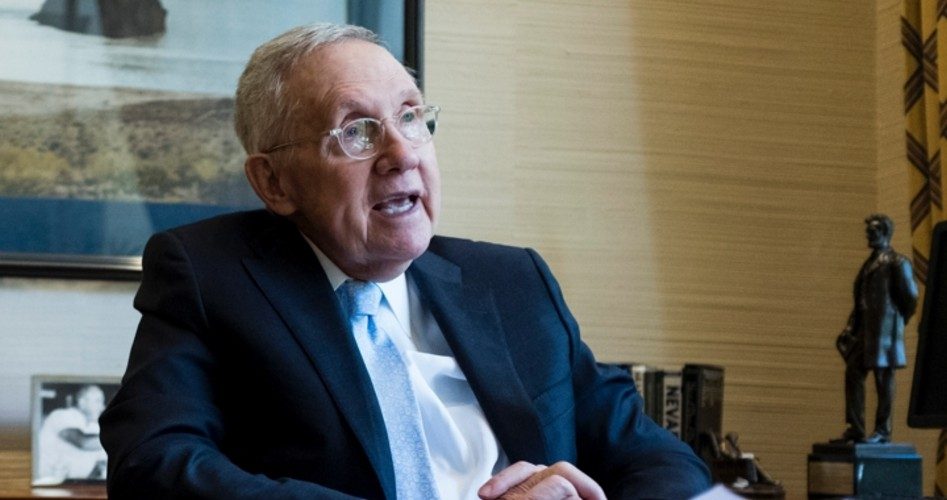
Podcast: Play in new window | Download ()
Subscribe: Android | RSS | More
Former Senate Democratic Leader Harry Reid says Democrats are jeopardizing their party’s prospects of retaking the White House by embracing “Medicare for All” and open borders.
In an interview with Vice News, Reid, who retired in 2017 after sustaining injuries in a fall, suggested his fellow Democrats moderate their stances on these issues to something approaching the party’s positions of just a few years ago.
Asked if he thought supporting Medicare for All, a single-payer national healthcare system, would be problematic in the 2020 general election, Reid responded, “Of course it would be. How are you going to get it passed?” Unless Democrats retain control of the House of Representatives and take both the Senate and the presidency, such a bill would almost certainly be shot down.
Instead of pushing Medicare for All, Reid said, “I think that we should focus on improving ObamaCare. We can do that — without bringing something that would be much harder to sell.”
“Improving ObamaCare: People understand that. They would appreciate that. It locks in many important things,” Reid maintained.
Given that Americans do understand ObamaCare and have consistently opposed it — even now, it is not supported by a majority of the public, according to the latest Kaiser Family Foundation (KFF) tracking poll — perhaps they wouldn’t appreciate “improving” it. Or maybe their idea of improving it is repealing it, as Congress and President Donald Trump have partially done.
Still, Reid is probably right that Medicare for All is electoral poison: KFF also found that 51 percent of Americans oppose single-payer healthcare. Nevertheless, much of the Democratic presidential field, including Senators Bernie Sanders (I-Vt.), Elizabeth Warren (D-Mass.), and Kamala Harris (D-Calif.), has signed onto the unconstitutional proposal. Former Vice President Joe Biden, on the other hand, has taken Reid’s position.
Those same candidates — again, minus Biden — have also adopted the position first espoused by former Housing and Urban Development Secretary Julian Castro that the misdemeanor penalty for illegally entering the United States should be repealed.
Asked if adopting this position would be politically problematic in the general election, Reid replied, “Of course it is.”
“People want a fair immigration system,” he argued. “They don’t want an open-door invitation for everybody to come at once.”
Certainly, the vast majority of Americans, regardless of their political persuasion, oppose open borders, so Reid is correct on that count. However, Democratic politicians’ idea of a “fair” immigration system — e.g., the Development, Relief, and Education for Alien Minors (DREAM) Act — may differ from everyone else’s (although polls do show most Americans favor the general outline of the DREAM Act).
Reid further called on the Democratic presidential candidates to take up the cause of eliminating the Senate’s filibuster rule, a point he also made in a recent New York Times op-ed, where he claimed Republicans were using the filibuster to thwart the will of the American people.
“The filibuster is just no longer useful. The Senate does nothing anymore. No one offers amendments; they can’t, [Senate Majority Leader Mitch] McConnell won’t let them. All they do is vote on judges, that’s all they do,” Reid said. “I think it would be better if the Senate have [sic] majority rule. Where did we ever come up with 60 being the magical number?”
Reid didn’t offer his advice because he’s some kind of moderate; his lifetime score on The New American’s Freedom Index is an abysmal 18 percent. He did it because he understands politics. Reid held public office almost continuously for nearly half a century, including two terms in the House and five terms in the Senate. He is the longest-serving senator in Nevada’s history and one of only three senators to serve at least eight years as majority leader.
While Reid may privately share his fellow Democrats’ enthusiasm for single-payer healthcare and open borders, he knows that policy changes generally happen incrementally (cue boiling-frog analogy). Americans are unlikely to vote for candidates promising to enact both policies in full, but they might be willing to support those who favor incremental changes in the direction of those objectives, as Reid is essentially suggesting.
Democratic candidates, therefore, would be wise to heed Reid’s advice. Those of us who cherish liberty should hope they don’t.
Photo: AP Images


